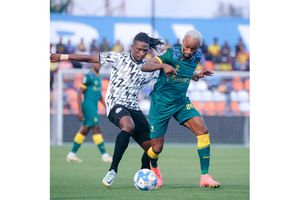We need more Inclusion of children with special needs

Al-Muntazir Special Education Needs (Amsen) children pose for a photo with their teachers.
PHOTO | COURTESY
What you need to know:
Every teacher in Tanzania needs to have basic training in special education teaching methods and every school needs to provide inclusive education by having an education unit for these children. And this has to be a joint effort by all education institutions, believes Amin Valji, one of the board members of Khoja Shia Ithna-asheri Jamaat (KSIJ) central board of education.
Whether a child is born or is affected by autism spectrum disorder, cerebral palsy, down syndrome or a developmental delay, the individual differences of each of these special children need to be addressed.
Every teacher in Tanzania needs to have basic training in special education teaching methods and every school needs to provide inclusive education by having an education unit for these children. And this has to be a joint effort by all education institutions, believes Amin Valji, one of the board members of Khoja Shia Ithna-asheri Jamaat (KSIJ) central board of education.
But many special needs children are often hidden at home or sent to the street to beg where they are seen as cursed or incapable.
“It is very sad when we come across parents who think that the special needs child is a curse or is bewitched. It is also very heart-breaking when a child is removed from school just because the parents either cannot pay the fees or a school finds the child incapable,” says Zahida Chagani, coordinator of Amsen (Al-Muntazir Special Education Needs) organisation.
Amsen is one of the institutions of KSIJ that is breaking down barriers by encouraging inclusive education for these children.
“Six of our students have been able to join the mainstream school at both primary and secondary level,” says Zahida pointing out to the fact that if these children receive a set attention, they can enjoy and should enjoy the rights of a normal child.
Education can play a key role in changing the mentality of many parents. It might not be easy for the parents dealing with day-to-day challenges of their special needs child. Institutions like Amsen help parents understand what exactly the centre will be doing by sharing an individual education plan. A home programme is also shared for the parents to work from home.
This helps foster a development process much faster. The institution doesn’t restrict itself in the four walls, it also conducts parental workshops. Also, the staff visit their homes to help parents deal with the day-to-day challenges.
Mrs Candy Ngeny, parent of Jacob, who is one of the students at Amsen saysw hen Jacob joined the school, he wasn’t doing very well. His speech was bad, he could not concentrate for long and he was poorly organised.
Mrs Candy goes on to say that basically, her son’s life as a child wasn’t good. “But since he came to this school, his speech has improved, he is more focused, and when you tell him to do something, he does it. His ability to get organised is good, he organises his own toys and clothes,”
Her son now helps her in the kitchen too. Basically he does everything a normal child does. “This has changed our lives. Once Jacob’s life changed, our lives as parents changed too – we have stopped worrying,” Mrs Candy says.
The goal of this school extends to not only inculcate academic skills, but also life skills so that the children can become productive and lead a meaningful life.
“I am very happy for my son Eric to be here at Amsen. Since he has been at this school, my family and my wife have witnessed a positive change,” says James Mpayo, the parent of Eric Mpayo.
In the school his son had earlier enrolled, he achieved very little in six years. But since he joined Amsen, there has been tremendous development both at school and at home.
In the classroom environment, special needs children learn how to socialise and work with others and at the same time the individual goals are met. Importantly, the school does not separate the disorders but rather groups them according to ability.
One of the teachers at Amsen, Nyembezi Mbano believes that early involvement of these children into an education programme is important. He says the different therapies designed for these children bring out awareness of themselves and others.
“We work on the five senses in the beginning and further explore the sense of integration. The activities are designed to help them adapt to different transitions,” he explains.
These inclusive activities include setting up an inclusive classroom in the nursery mainstream school whereby 10 children of Amsen have been included and are trained for the classroom environment. Also learning centres have been set-up in primary schools where children with special needs are supported in the mainstream environment.
Amsen is currently training 80 special needs children to become independent members of the society, some supported through scholarships. Zahida explains that additional teaching facilities are provided at the school such as occupational therapy, speech/communication therapy, sensory integration, aqua therapy and vocational skills.
“Pre-vocational skills help a child develop independent skills that lead us to understand their strengths and weaknesses. Vocational skills help a child to perform his/her daily chores with ease and allow them to take up a small job for their living,” Faryal Chilwan, a teacher at Amsen explains on one of the additional facilities.
In 2013, Amsen had a child who at the beginning used to walk on his knees. Today, he walks on his own and his speech has also improved.
“We groom these children to be part of the society by helping them overcome their disabilities using various therapies,” says Alex Matee, an occupational therapist at Amsen.
Learning disability is also a part of special needs, however, children with this disability do not need to be put in a special needs centre. They have to be in mainstream schools and can be given additional support, Zahida explains the difference.




